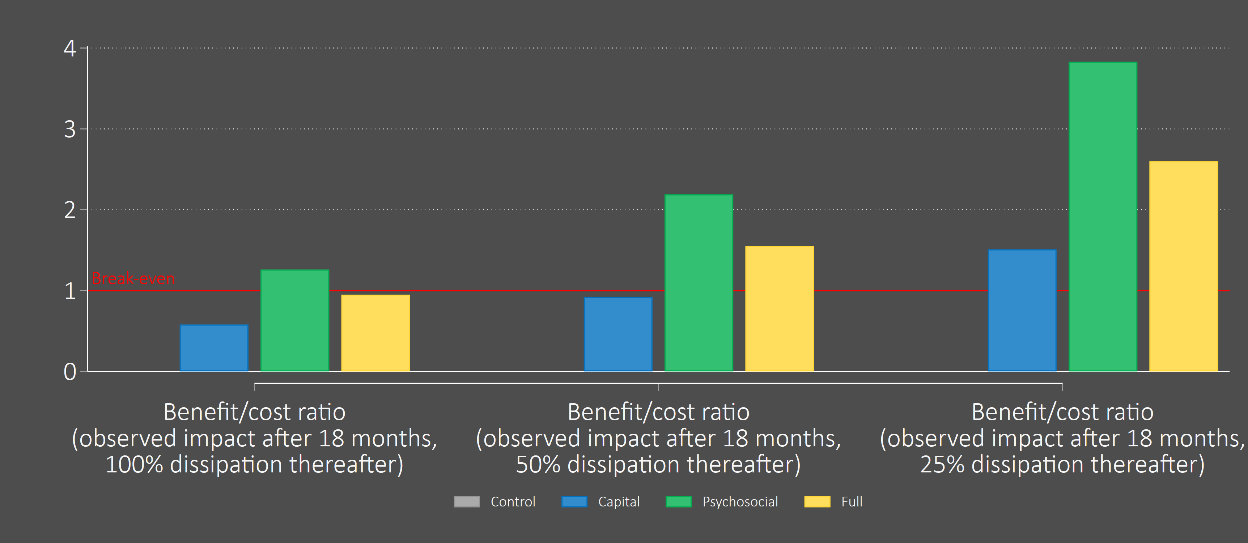 © Sahel Adaptive Social Protection Program
© Sahel Adaptive Social Protection Program
In a previous post we introduced a set of productive inclusion measures that governments in Burkina Faso, Mauritania, Niger and Senegal implemented to improve the well-being and boost the resilience of more than 50,000 cash transfer beneficiary households.
We now present the first findings from a multi-country impact evaluation. Results from Niger show that (i) households’ welfare and food security greatly improved – driven by large effects on revenues from income-generating activities and economic diversification; (ii) the productive inclusion measures were highly cost-effective; and (iii) women’s empowerment, psychological and social well-being significantly improved.
How can governments open pathways out of extreme poverty? To protect and support the poor, governments across Africa have set up and expanded social safety nets. Cash transfer programs provide a buffer for poor families and help them invest in their human capital and livelihoods. However, evidence has indicated that more is needed to address the root causes of poverty. Multi-faceted programs that address several key constraints simultaneously are increasingly seen as promising interventions to generate sustained poverty reduction.
In recent years, governments in the Sahel have offered integrated productive inclusion interventions to support extreme poor households’ economic activities and encourage diversification. In addition to regular cash transfers, beneficiaries (more than 90% women) received:
- a core set of measures consisting of coaching, group savings facilitation, entrepreneurship training and improved access to markets;
- a lump-sum cash grant;
- psychosocial interventions in the form of life skills training and a community sensitization on aspirations and social norms.
A multi-country randomized evaluation is underway to determine the impact and compare the cost-effectiveness of three packages: a capital package that includes the cash grant in addition to the core components, a psychosocial package that includes the psychosocial components in addition to the core components, and a full package that includes all components.
Villages with existing cash transfer beneficiaries were randomly allocated to one of the three packages or a comparison group. In Niger, the randomized controlled trial included 329 villages and over 22,000 households across five regions.
Impacts on consumption and food security were spectacular
All three productive packages improved household consumption, while food insecurity significantly decreased, and impacts were sustained 18 months after the intervention. Households were able to spend more on items that they needed, both food and nonfood. While the impacts were seen for all three packages, the full package delivered the strongest results: 18 months post-intervention, beneficiaries of the full package had increased their consumption by 15%. Interestingly, though impacts were initially below the full package 6 months post-intervention, recipients of the psychosocial package had nearly caught up 18 months post-intervention. Across all three groups, food insecurity also significantly decreased.
This result was due to large increases in revenues from household off-farm businesses, as well as from livestock and agriculture. We measured revenues across three main types of activities: off-farm business revenues, agricultural harvest values, and livestock revenues. Impacts were particularly strong on off-farm businesses—indicating that women had been able to expand non-agricultural activities. All three sets of productive measures had strong impacts on beneficiaries’ business revenues, by a whopping 49%-102% 18 months post-intervention. Women spent more time on their income-generating activities and were able to focus on more profitable non-agricultural businesses. Substantial increases in livestock revenues were also observed in the capital and full packages, as well as in agricultural revenues in the psychosocial and full packages 18 months post-intervention.
Across all three packages, households developed new income sources. This is noteworthy because diversification is an important factor in building household resilience.
The Niger intervention is highly cost-effective
In Niger, the program kept costs low by leveraging the delivery mechanisms of a government-led national cash transfer program. In total, costs were $263 per beneficiary for the psychosocial package, $482 for the capital package, and $584 for the full package. The cash grant ($321) was the main cost driver. These costs are much lower than graduation-style programs that have been implemented in other contexts.
As a result, the Niger productive inclusion interventions were highly cost-effective. The impacts on consumption alone (without considering impacts on assets, etc.) were so large that they already exceeded intervention costs 18 months after the intervention for the psychosocial package, and almost broke even for the full package. The capital package had a lower benefit-cost ratio, due to the relatively large cost of the cash grants and the limited extra welfare impacts it generated.
Strikingly, when using the same assumptions about the sustainability of program impacts as in the literature, the benefit-cost ratios estimated in Niger are several times larger than already very effective traditional graduation programs implemented by non-governmental organizations elsewhere.
The program strongly improved women’s psychosocial well-being
Impacts on social inclusion and psychological well-being were strong and sustained for all three packages. Some dimensions of women’s empowerment also improved. We will discuss these in detail in a future post.
The Sahel experience shows great promise for the scale-up of economic inclusion programs though safety nets
The delivery of productive inclusion interventions to cash transfer beneficiaries generated strong results on household welfare and encouraged households to shift into more productive economic activities. The results show that government-run safety net systems provide a platform to scale up highly effective multi-faceted interventions. This is a promising avenue to simultaneously reduce extreme poverty, improve productive employment opportunities, promote women’s empowerment, and boost household resilience.
*The work described in this post was undertaken in collaboration with the safety nets unit of the government of Niger. The impact evaluation was carried out jointly with Markus Goldstein, Dean Karlan, Harounan Kazianga, William Parienté, Catherine Thomas, Christopher Udry, Julia Vaillant and Kelsey Wright
*This work was made possible through the generous support of the Sahel Adaptive Social Protection Program (SASPP), a multi-donor trust fund managed by the World Bank that supports the strengthening of adaptive social protection systems in the Sahel (Burkina Faso, Chad, Mali, Mauritania, Niger and Senegal) to enhance the resilience of poor and vulnerable households and communities to the impacts of climate change. The program is supported by Denmark, France, Germany and the United Kingdom.






Join the Conversation